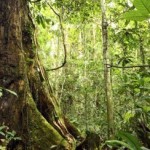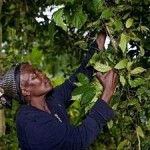 Another example of the delicate relationship between carbon, biodiversity and people was the creation of a buffer zone around Nepal’s Chitwan National Park. Trees were planted in severely degraded areas, and natural regeneration was promoted in less degraded forest habitats as a means of reducing pressure on the park and to provide firewood and other products to local communities. An unintended consequence of this forested buffer zone was an increase is human–tiger conflict as tigers were able to roam beyond the limits of the park. In this case, both the costs and benefits to local communities were significant while benefits for biodiversity and carbon were positive.
Another example of the delicate relationship between carbon, biodiversity and people was the creation of a buffer zone around Nepal’s Chitwan National Park. Trees were planted in severely degraded areas, and natural regeneration was promoted in less degraded forest habitats as a means of reducing pressure on the park and to provide firewood and other products to local communities. An unintended consequence of this forested buffer zone was an increase is human–tiger conflict as tigers were able to roam beyond the limits of the park. In this case, both the costs and benefits to local communities were significant while benefits for biodiversity and carbon were positive.
The REDD+ Landscape
REDD+ interventions, even if limited to one specific site, will often have impacts beyond the immediate surroundings. Therefore, the report highlights the importance of expanding the program’s scope to include an integrated landscape management approach that helps identify and address trade-offs between biodiversity and carbon goals and better highlights the effects of REDD+ actions on stakeholders. This approach, together with regionally customized strategies that involve all stakeholders, is key to addressing and reconciling the many environmental, social and economic aspects relevant to REDD+.
“We need to consider all of the priorities for a particular landscape, such as food production, clean water, economic development, conservation and cultural and social values, to understand the different pressures facing forested areas”, said Wildburger. “It may not be possible to reconcile all of these concerns. But over the long-term, REDD+ programs will not succeed, even at conserving carbon, unless there is a recognition of the trade-offs involved and an understanding of the relationships between biodiversity, carbon, forest management and people.”
The International Union of Forest Research Organizations (IUFRO) is the only world-wide organization devoted to forest research and related sciences. Its members are research institutions, universities, and individual scientists as well as decision-making authorities and other stakeholders with a focus on forests and trees. For more information, visit www.iufro.org.
Source: IUFRO.








